- Home
- Anthony Burgess
Honey for the Bears Page 19
Honey for the Bears Read online
Page 19
You fell for Glamour as much as I did. You fell for the Big American Glamour like you all do and pretend not to. Yap yap yapping about Deadly Transatlantic Influence and hardly able to lap lap lap it up fast enough. Oh you do so much want to be Absorbed. The only way you can go on existing, I guess, is to become an Idea in somebody’s mind. A ready-made memory, that’s what it is, ready to be bought up by a mind that thinks it’s oh so classy to have a long memory and not much trouble in acquiring it. That means you won’t have to trouble about the practical side of surviving when you just become the Big American Museum. The men won’t have to trouble to breed any more and can just go off with their boy-friends, their dear dead Roberts, without feeling guilty or worrying about Duty any more. And what will the women do then, poor things?
The trouble is, I guess, that you, and I do mean You, don’t want to live any more. You want to lay down the burden of having to feel responsible about anything. Wait for the end and meanwhile sell off the furniture bit by bit to buy Sugar-Pops and Caramellos. But don’t do anything to provoke the End, oh no. Wait for Rocking-chair Jack to blow the whistle or Comrade K to kill off with a jumbo-size blast his few thousand Western-type megafolk. Meanwhile moon with your wartime boy-friend and sing the old sad songs you sang when you were in a Tight Corner and keeping a Stiff Upper Lip what what chaps.
Oh, I know I shouldn’t be talking. But I’ve a right to a bit of Love and a bit of security and yes warmth and I’ve waited a long time for those. What I didn’t expect and what I could never even have dreamed of expecting was that I should have to come as far East as this for a bit of peace and a bit of affection and to feel that I’m Wanted. Or perhaps I’m a fool as I was with Sandra but I don’t think so somehow. Sandra was very frivolous. Even the special physical things she knew, and my God did she know them, she knew in a very frivolous way, like someone who can play pieces on the piano only through having been shown where to put her fingers. There were one or two others before Sandra, but it won’t help any to say who they were. Anyway, I guess that side of it isn’t all that important. It’s the security that’s important. It’s the feeling that you’re protected from that terrible terrible big howling wind.
And so now there’s Sonya—Dr Lazurkina, if that’s how you spell it, to you. But it’s not just Sonya as a person, as an individual that is, but what lies behind Sonya, and all that’s so very solid and real. And I don’t mean the Soviet System and the Communist Party, for I feel about Communism much as I was always made to feel, except that I don’t see that systems matter much to ordinary little people like me. It’s only the boys and girls at the top, I’d say. Everybody I’ve met seems happy enough. I don’t see anybody trembling in Deadly Fear. What I feel about Communism really I guess is that I’m sorry for all the politicians and tycoons and teachers and writers in the West who feel sorry for themselves when they think of themselves having to live in a Communist State. But I’m not clever enough to ever have to worry about that. No, what I mean when I say what lies behind Sonya is something as simple as Love, because Love is about the only thing these people have had to keep them going through all their terrible historical changes, famines and sieges and purges and scorched earth and terrible poverty. And I suppose Love has nearly disappeared in England and the United States of America because there are so many easier substitutes for it.
What has happened is that Sonya is being transferred, which is what she wanted, to this place called Rostov, which is on the Northern Shore of the Sea of Azov, as I’ve seen from a map. That’s more her part of the world, as her mother lives in a place called Simferopol, or near there, which is in the Crimea. I’m still to be under her medical supervision, though really I feel fine now though very very tired, and so we’re going down there together, the idea being that she’s taking her fortnight’s leave which is due to her from last year, so we can get off straight away, which is by the evening plane. I asked about money but she says I’m under the State Medical Service. Then I said I couldn’t be under the State Medical Service for everything, but she says that when I’ve had a Convalescence I can do some lecturing, if I wish. Lecturing in English, that is, on Life in the West. But she says I’m not to think too far ahead into the future but to get well first. I feel quite well, as I say, though very tired, but she knows best, being a doctor. One thing she said I could do was to apply for Political Asylum, but I’m not too sure what that means.
I would like to have some money of my own, though, and you’ll be the first to say I’m entitled to it, as it was my little bit of capital that started you in the shop. In the meantime you could let me have some of the money you’ve gotten out of selling the dresses, say about half the total amount. The way Sandra let me down I guess that’s only my rightful due. Sonya suggests you pay any monies into her account, which is quite easy to do. There’s the Gosbank in Leningrad and you know Sonya’s name and the hospital here, and it will catch up with her and then with me fairly quickly.
I never approved of having both of us on the one passport, so things would be very awkward if I hadn’t kept my US passport. This is out of date, as you know, but I guess the US Consulate or whatever it is can put that right for me. Anyway I have Sonya to look after me and there won’t be any trouble about documents. When I decide to come back to England I’ll let you know. But I’m not giving you any addresses now because I don’t want you to have any part of this decision one way or the other.
I’m sorry things have to be left a bit vague, but please remember I am under Medical Supervision and Sonya knows better than either you or me what’s best to be done. I guess, to be quite realistic, you’ll get along all right without me. But look after Pinky and don’t give Pinky cold milk, she likes it warmed up with a little sugar in it. And if Pinky wants to sleep on the bed at night don’t start pushing her off. There are one or two things I shall want you to send, but it all depends on how long I stay in the CCCP (I’ve started learning the alphabet already and can write my name in it). Don’t worry about me is the important thing, because I’ll be fine, I know I will. It may seem a funny sort of thing to say, but I feel as if I’d come home. Not the home I had but the home I should have had. Look after yourself, darling. Love from.
9
‘ALL RIGHT, THEN,’ SAID MADOX, HANDING THE LETTER BACK to Paul. ‘You let her get on with it, my old mate. But if she was any wife of mine I’d not have her back, not likely. Not that I’m married nor ever would be, not a man in my circumstances.’
Paul was lying dead-beat on Madox’s bed, still panting. It had been so hectic a morning, and everything on foot, Paul having no money for a taxi or even a tram. And here in the Evropa Hotel all the lifts said Nye Rabotayet; he had had to climb up here to Madox’s room. And, coming to the hotel, he had forgotten Madox’s name. He had been wretched, striding up and down that vast grubby lounge, from which cruel sunlight thwacked out dust like a carpet-beater, up and down past the bald and scholarly looking man in a dog-collar who was unhappily reading the Daily Worker, no other British paper being available; up and down past the three elderly Finns sitting in a conspiracy of misery, as though they too were trying to remember Madox’s name. At last it had come as from heaven: ‘Paul, thou maddest.’ Was that Wyclif’s version? He had once sold on commission a polyglot New Testament, all in English.
He folded and then refolded the letter. It was very thick, and it would not take a third folding. He then threw it pettishly into the waste-paper basket. ‘Wait, wait,’ said Madox, retrieving it from among cigarette-packets and two empty whisky-bottles. ‘You want to keep that. For evidence. I’d call that desertion, I would.’ He unfolded the letter and began to read it again. He was wearing a shot-silk dressing-gown with blue pyjamas patterned like floral wallpaper; his slippers had fur on them. ‘What is a real godsend here,’ he said, reading, ‘is this business about the double passport.’
‘How do you mean?’
Madox came over and sat on the bed. He looked into Paul’s face with sincere piss-coloured
eyes. ‘You said something about wanting money.’
‘She’s entitled to some money. That’s true what she says there, about starting me up in business. Besides, she’s still my wife. I have a certain responsibility. I can’t bear to think of her left stranded in a strange country.’
‘Awwww,’ went Madox, gripping Paul’s left ankle, ‘women can always look after themselves. Better than men in some ways. What I was thinking about was you taking some money home. That was the idea, wasn’t it?—to take some money home. Now then.’ He inched closer. ‘How do you stand with the police?’
‘Oh,’ sighed Paul, ‘all right, I think. Karamzin almost made the sign of the cross this morning when he saw what looked like teeth in my mouth.’
‘That must have been a very powerful belt in the grinders,’ said Madox, looking into the emptiness between Paul’s lower canines. ‘But those gums seem to have healed lovely.’
‘It’s a long story,’ said Paul. ‘These two lads, you see, good honest artisans, made me a temporary denture out of orange peel. I soon lost it, though. It fell out when I was running.’
‘Running from?’
‘Running to. The hospital, that is. I knew it, I knew what had happened. When they handed me that letter I knew what was inside.’
‘Like intuition,’ said Madox thoughtfully. ‘It does happen. It’s happened time and time again with the Doc. But not me. It’s all thought and working-out-in-the-mind with me. Everybody’s made different, the way I see it.’
‘Zverkov,’ said Paul, ‘told me he’d rung up the hospital and been told that there was a Mrs Hussey there. That must have been just before they went off together. God curse that woman.’
‘For all you know,’ said Madox, ‘she may still be there. She may be all cuddled up with this doctor pal of hers still in that hospital there. It seems a bit short notice to me, just buggering off to the Crimea like that. It’s very nice down in the Crimea,’ he added, ‘especially at this time of the year.’
Paul began to get up from the bed, but Madox held him down with a surprisingly tough grip on both his ankles. ‘Damn it,’ cried Paul. ‘I’ll go back to the bloody place. Everybody’s trying to make a monkey out of me.’ But he was exhausted. He sank back again on to the pillow, sighing.
‘That’s right,’ soothed Madox. ‘It won’t do any good, wherever she is. You just let her have her own way.’
‘Brain-washed her, that’s what they’ve done, the bastards.’
‘You can’t do anything about her now,’ said Madox. ‘First things first is what I say. Tell me more about what the police said.’
‘Oh, they said they’d made provisional bookings for my wife and myself on the Alexander Radishchev. That sails tonight. Helsinki, Rostock, Tilbury. It was up to me to confirm the bookings by presenting my open return tickets. They were very nice, I suppose, really. They told me not to be such a silly boy next time.’ Paul began to snivel.
‘Now, shut that,’ said Madox sharply, ‘or I’ll give you a back-hander.’
‘All right,’ snivelled Paul. ‘You too. It’s all bloody violence here. Go on, get on with it.’
‘What it is,’ said Madox more reasonably, ‘is that it’s all like a lot of kids. Hitting each other and crying boo hoo hoo. You get into the same way yourself if you don’t watch it.’ He thought a moment, still gripping Paul’s ankles tight as though Paul were a very speedy motor-cycle. ‘And of course all that ties up too—this business of giving presents. I should think that business of you giving away all those dresses for free must have touched a fair number of soft Russky hearts high up.’
‘How did you know about that?’
‘Oh, everybody was talking about it here in the hotel. If this Pravda had been more like a real paper and not a lot of bloody Party propaganda there would have been an item about it this morning. Not that I can read much of the language myself. The Doc can, though. Very clever the Doc is. Now then,’ said Madox, ‘what’s the name of that ship again?’
‘What ship? Oh, that. The Alexander Radishchev.’
‘Queer spitting lot of names they have. You get used to them, of course, but now and then it dawns on you that they’re a queer old lot of names. Like that music bloke you were shouting the odds for that time on the boat. What was his name now?’
‘Opiskin.’
‘That ship name sounds like “radishes” and this name sounds just rude. But not to them, of course. And why does this Piss bloke mean so much to you?’
‘Look,’ said Paul, ‘all I came for was a little bit of a loan, that’s all. Just to tide me over. And a bit of advice, that’s all. Not to talk about Opiskin.’
‘Opiskin, Opiskin, Opiskin,’ said Madox with his eyes closed. ‘I must remember that name. As for a little bit of a loan, as you call it, I think we can do better than that. But first you must tell me all about Opiskin.’
‘This other ticket,’ said Paul, ‘the one for my wife, isn’t returnable. Not here, anyway. Back in London, but not here. Just a couple of quid, that’s all I need.’
‘Opiskin,’ said Madox.
‘Oh,’ said Paul, resigned, turning his face to the wall wearily, ‘he was a favourite composer of my greatest friend. This friend of mine thought the world of him. I thought the world of this friend. Selling these dresses was a means of helping his widow. That’s all. And it didn’t come off. A real bloody mess all round, that’s what this trip to Leningrad’s been.’
‘Don’t say that,’ said Madox firmly. ‘Do not say that. Just let me have a look at that passport of yours.’
‘Look,’ said Paul, ‘if you don’t want to help, don’t bother. But if you think you’re going to get me mixed up in some other shady bloody business …’
Madox was rummaging with light fingers, pick-pocket-swift, in the jacket that Paul had removed and hung on a bedpost. ‘Ah,’ he said, taking out the little book which, between covers solid as walls, affirmed Paul’s identity, ‘this is it. And very nice, too. A good-looking woman, your missis. A bit of a will of her own, though—you can see that.’
‘Look,’ repeated Paul, ‘what exactly are you trying to …’
‘Helping.’ Madox smiled. ‘Helping, helping. Helping the cause and helping you, my old mate. What was that name again—Opis … ?’
‘… kin. Where I’m going now,’ said Paul, getting up from the bed, ‘is to see the Consul or whoever it is. That’s where I should have gone in the first place, damn it. I’m getting out of here, and thank you for nothing.’ He was on his feet now, smoothing his wrinkled trousers.
‘Where you’re going,’ said Madox, ‘is to see the Doc. The Doc is in bed at the moment, having had a very busy night. The Doc helps people, and helping is very hard work, as you may or may not know. But the Doc, I should think, will be very glad to see you. You just wait here. Five minutes only. Then I will bring you into the Doc’s presence. Help yourself,’ Madox invited. He opened a chamber-pot cupboard by the bed to disclose shining glasses and bottles. ‘No ice, but you can’t have everything. Go on, spoil yourself. I’ll be back in five minutes. Opiskin,’ said Madox and went out.
Drinking a large raw shuddering bourbon, Paul walked round the room, hardly able to think but not really wanting to: his brain played a kind of solitaire with all shiny picture-cards—Hussey as Queen and Knave mainly, holding odd objects of spurious antique interest, but Hussey also as Mr Horsebrass The Curio Man, bowing prettily with an empty shop behind him: empty, empty, empty, ah God. Then a wild Joker with Old Testament Fagin face. Let her get on with it then, my old mate: I never loved her anyway. I hope you’ll be happy but I hope you’ll wake up suddenly in the night with pains of remorse more terrible than the pains of oncoming menses, and when you think you’re going to come back you’ll get a bloody shock, my lady. He’s moved, he’s moved, no we don’t know where, oh he sold up the shop lock stock and barrel months ago and never said no manner of word to nobody. Abroad, they say, somewhere overseas to make a new start. His heart was broken.
Broken, eh? That’s a good ’un, that is. Paul did not like the taste of the bourbon much; he gave himself a fair slug from a multiface bottle labelled Old Mortality. The trembling of the hands was what he did not much care for, either. A tremor of intent. Bottle and glass played a bar from that bell-thing of Opiskin’s. Madox came back in. ‘Righty-ho,’ he said happily. ‘The Doc will see you now.’ And then, ‘You could do with seeing a doc, really, the way you are. But we’ll have you fine for tonight. Plenty of rest is what you need. A hero, that’s what you’re going to be.’
‘All I ask,’ said Paul, ‘is a small loan. I don’t want anything else.’ Madox led him briskly out on to the corridor. An old babuchka was sweeping its long penal-looking stretch very slowly, grumbling, using a yard-brush. The Doc’s room was a couple of doors down, not far from the loaded desk (framed family photographs chiefly, including a son in the Navy) of the floor concierge. Madox knocked, inclining slightly to the tough elegant old oak, an imperialist door. A remembered flute of a voice sang loudly that they should enter. This they did.
‘Of course, of course—how well I recall the face. But not the mouth. Dear, dear, dear. Our touristic friend. But it was not tourism at all, hm? Ah well, truth is a precious commodity: it is not to be bandied about among strangers. But the stranger phase has passed now, has it not? Very well, then: we can put some of our cards on the table.’
Dr Tiresias, in a most fetching brocade jacket, was sitting up in bed. The bed was no better than that in Madox’s room, but it had been transformed, transfigured, by what seemed to be a detachable headboard with embossed gilt rococo cherubim, also a lacy bedspread that looked like an altar-cloth. Beside the bed was a silver coffee service, together with a covered toast-dish. The Doctor had let slide to the floor what appeared to be that day’s issue of The Times: that was not, of course, possible, but the paper certainly had the crisp ironed look of a paper but newly delivered. The Doctor had in his or her long bones of fingers what seemed to be a small devotional book but proved to be Paul’s passport. But Paul’s eyes were soon drawn back to the magnificent epicene head with its grey mane, an apocalyptical eagle-hawk-lion: Bertrand Russell in Trafalgar Square, Yeats among schoolchildren, Lady Gregory herself, august and sphingine, the bisexual Lilith from which Adam and Eve were, in paltry segmentation, feigned apocryphally to derive.

 A Dead Man in Deptford
A Dead Man in Deptford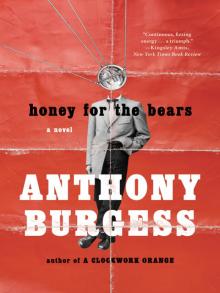 Honey for the Bears
Honey for the Bears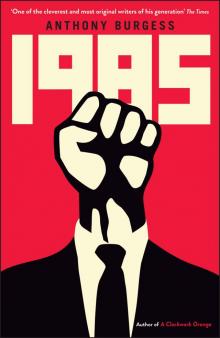 1985
1985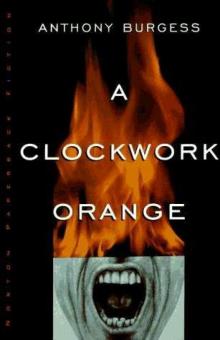 A Clockwork Orange
A Clockwork Orange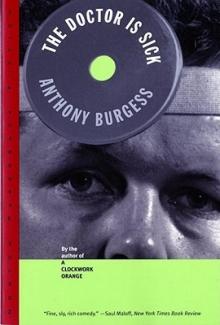 The Doctor Is Sick
The Doctor Is Sick Earthly Powers
Earthly Powers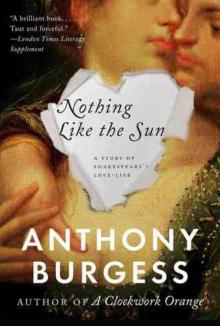 Nothing Like the Sun
Nothing Like the Sun Collected Poems
Collected Poems The Kingdom of the Wicked
The Kingdom of the Wicked The Wanting Seed
The Wanting Seed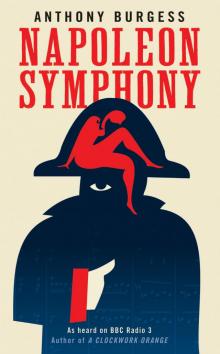 Napoleon Symphony
Napoleon Symphony The Malayan Trilogy
The Malayan Trilogy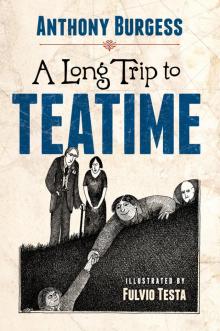 A Long Trip to Teatime
A Long Trip to Teatime Enderby Outside
Enderby Outside M/F
M/F The Complete Enderby
The Complete Enderby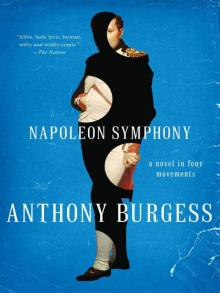 Napoleon Symphony: A Novel in Four Movements
Napoleon Symphony: A Novel in Four Movements Enderby's Dark Lady
Enderby's Dark Lady The Clockwork Testament (Or: Enderby 's End)
The Clockwork Testament (Or: Enderby 's End) ABBA ABBA
ABBA ABBA A Clockwork Orange (UK Version)
A Clockwork Orange (UK Version)